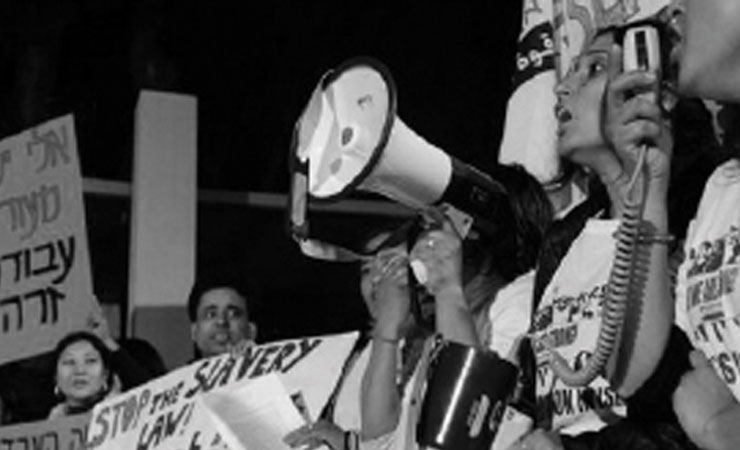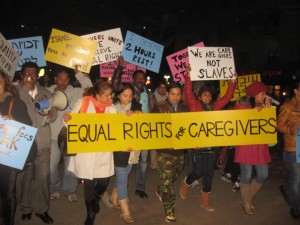By Roni Livneh and Rony Margalit
Israeli law applies to all domestic workers and is not dependent on their legal status. As such, labor laws apply to migrant workers just as they apply to citizens. For example, migrant workers have the right to earn minimum wage and employers are required to make pension plan payments as provided in the extension order of 2008. However, in an unprecedented manner, the rights expressed in the Rest and Work Hours Law were denied to a group of workers: caregivers, migrant workers from countries that are very poor, who earn a monthly minimum wage salary with no overtime and are made to work 24 hours a day with no break, day off, or vacation.
The Rest and Work Hours Law establishes the number of hours in a workday, days of rest in the week, payment for overtime and for work on Saturday and holidays. This law applies to all workers in the economy including migrant workers. However, following the High Court decision of March 2013, caregivers were denied their rights to overtime pay and were excluded from the pension law. This means that they can be occupied 24 hours a day with no break, no day off, and work on Saturday and holidays with no right to overtime pay.
Thirty percent of workers do not have a day off during the week which means they work seven days a week for many months at a time. Recently a worker who came to Kav LaOved office said that she was not allowed to leave her place of work for six months. This violation of workers’ rights is now legal in Israel.
Last year a verdict was handed down in the Jerusalem District Court regarding a caregiver imprisoned for two years by her employers in the bathroom in their house. She was not allowed to make contact with the outside world and was given only short food breaks. In an unprecedented conviction the court defined her work conditions as slavery. The verdict pointed to extremely long work hours and denial of vacation.
Excluding a specific group of workers from a law that defines rights and regulations, which result in violation of their rights, is an unusual and abusive act. The Israeli government made a conscious decision to bring migrant workers to the caregivers market and therefore must take responsibility of the well being and protection of these workers.
One way to deal with the caregivers’ difficult situation is to sign the United Nations International Labor Organization (ILO) Domestic Workers Convention (Convention C189). This convention came into effect in September 2013 and is designed to promote and protect the rights of people who are employed in of all types of domestic work. The convention defines their right to equality before the law, the freedom to choose their employer, and protection from paying extremely high brokerage fees for the right to work in a foreign country.
On Saturday the caregivers of Israel marched for equality and rights. They called on the State of Israel to sign the Domestic Workers Convention. The march began at LevinskyPark in Tel Aviv and ended with a gathering at Habima Square. MK Michal Rozin and representatives of the workers were among the speakers.
[Translation: Sharon Kerpel]



